Decades: Compiling the Ultimate Library with Jamie Mollart
Happy New Year! For all the financial services workers in the UK this week marks the start of a brand new tax year (2022/23 as it turns out). So I thought I’d acknowledge it on the blog for a wee change.
But you’re not here for tax chat, you’re here for the books. Specifically you’re here to see which five books Jamie Mollart has selected when he took on my Decades Challenge.
Quick recap before I hand over to Jamie: Last year I set myself the challenge of filling the shelves of a brand new library with nothing but the very best books represented. I knew I could not take on this epic task alone so each week I invite a guest to select five of their favourite books which they feel should be represented in my new library. When making their selections there are just two rules my guests must follow:
1 – Select ANY five Books
2 – You May Only Select One Book Per Decade From Five Consecutive Decades.
Sounds easy? I am assured it takes a while to settle on five and there are rumours of cursing and heartache as favourites don’t fall within the five consecutive decades rule.
This week it is my abolute pleasure to welcome Jamie Mollart to Grab This Book. Jamie’s latest novel, Kings of the Dead World is my #currentlyreading book and has been commuting with me on my train trips back into the office now that I am not exclusively working from home. It is making the trip to work much more manageable.
Over to Jamie…
 I’ve written two novels and am about to send my third to my agent. The Zoo was published in 2015 to some pretty good reviews and press. I was made an Amazon Rising Star for that year and spent 2015/16 at some cool literary festivals. My second novel, Kings of a Dead World came out in 2021, was an Amazon bestseller, has a Waterstones edition with very beautiful sprayed green edges and was longlisted for the British Science Fiction Association best novel award.
I’ve written two novels and am about to send my third to my agent. The Zoo was published in 2015 to some pretty good reviews and press. I was made an Amazon Rising Star for that year and spent 2015/16 at some cool literary festivals. My second novel, Kings of a Dead World came out in 2021, was an Amazon bestseller, has a Waterstones edition with very beautiful sprayed green edges and was longlisted for the British Science Fiction Association best novel award.
I am a member of the Climate Fiction Writers League (https://climate-fiction.org/), Nottingham Writers Studio (https://www.nottinghamwritersstudio.co.uk/) , I’m a mentor for Writing East Midlands (https://writingeastmidlands.co.uk/for-writers/mentoring/), I have contributed to the Writers and Artists Yearbook (https://www.writersandartists.co.uk/advice/lessons-i-learned-writing-my-second-novel), and the Bookseller (https://www.thebookseller.com/blogs/cli-fi-time-1262857) and I’m a long standing guest on the webs oldest and most influential writing podcast, Litopia (https://litopia.com/)
If you want to find out more about me the best places are one twitter (@jamiemollart) or on my youtube channel (https://www.youtube.com/channel/UCsYzJh4RrSdYkM3e0o2WFOg)
If you want to get a copy of Kings of a Dead World with its lovely green edges you can do so here (https://www.waterstones.com/book/kings-of-a-dead-world/jamie-mollart/9781914518027) there’s also a hardback and audiobook version available here (https://www.amazon.co.uk/Kings-Dead-World-Jamie-Mollart/dp/1913207455)
DECADES
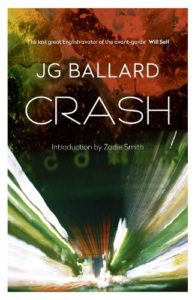 1970-1979 – JG Ballard – Crash (1973)
1970-1979 – JG Ballard – Crash (1973)
I could have chosen any one of several JG Ballard books from the 70’s because they’re all excellent – The Atrocity Exhibition, Concrete Island, or High Rise – but for me Crash is the one which is the best realised. The fact that it was filmed by one of my all-time favourite directors, David Cronenberg, is the icing on the cake. Ballard is all about high concept and Crash is no exception. He always seemed to be able to predict the future in a way which most authors don’t, and Crash is no exception to this. It also demonstrates Ballard’s ability to compress massive concepts into razor sharp narratives.
The narrator, James Ballard, is involved in a car crash which kills the other driver, and when he begins a relationship with the dead man’s wife the boundaries between the mechanical and the erotic become blurred.
When he meets Robert Vaughan, and is drawn into his sphere of influence, Ballard in turn becomes involved in a group who recreate the fatal car crashes of famous people for sexual pleasure.
The book was controversial at the time of release – ‘This author is beyond psychiatric help. Do Not Publish’ – and still has the power to shock, but in our increasingly Petro-chemical/celebrity obsessed world it seems even more important than when it was written. Not for the feint hearted, but for me essential reading.
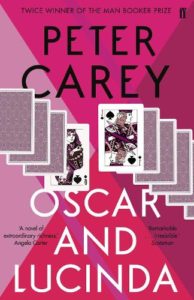 1980-1989 – Peter Carey – Oscar and Lucinda (1988)
1980-1989 – Peter Carey – Oscar and Lucinda (1988)
The Booker winner from 1988 is, in my opinion, the most perfect novel ever written. Populated with rich, flawed, and complex characters, this Victorian epic is weird, daring, romantic and challenging all at the same time. It also contains one of the most bravura set pieces I’ve ever read, which I can’t tell you about here because it’s a massive spoiler, but somehow Carey manages to make one act represent the entirety of not only the lead characters relationship, but the whole narrative. Annoyingly the book’s Wikipedia entry manages to blurt it out, so if you intend to read it don’t visit Wikipedia.
Oscar Hopkins is an Anglican Priest, Lucinda Leplastrier is an heiress to a glass factory, they are both gamblers, and when the meet on a ship they both find the other fascinating. It’s a love story that’s more about friendship than passion, while still managing to be incurably romantic. It’s about religion and fanaticism of all kinds, it’s about technology and the allure of it, it’s about how our childhoods affect us and so much more.
Carey loves a misfit character, and both Oscar and Lucinda fall into that category, but they are so lucidly drawn that I struggle not to think of them as real people. It’s one of the few books that I’ve read multiple times, it’s just not something I normally do, but Oscar and Lucinda calls to me regularly and I can’t help but return to it.
Peter Carey is one of the few writers who can turn his hand to anything and succeed every single time. He’s won the Booker twice and been shortlisted for it 5 times, no mean feat, and utterly deserved. Angela Carter also described Oscar and Lucinda as ‘novel of extraordinary richness, complexity and strength’, so if you don’t believe me, you should definitely believe her.
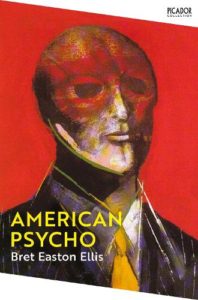 1990- 1999 Bret Easton-Ellis – American Psycho (1991)
1990- 1999 Bret Easton-Ellis – American Psycho (1991)
The ultimate dissection of 80’s excess and yuppie culture, American Psycho was banned on release in many places, and gained notoriety because of its aestheticized violence. What was largely missed at the time is that the book is clearly a satire and is actually laugh out loud funny in many places.
Patrick Bateman is a slick, vacuous banker on the Wall Street of the eighties. He’s obsessed with his hair, clothes, fancy restaurants, his sculpted body and making sure his business card is whiter and crisper than his colleagues. Oh, and at night he likes to murder people in increasingly depraved and meticulously described ways, whilst extoling the virtues of albums by people like Huey Lewis and The News and Whiteny Houston. As Bateman’s murder spree escalates and his grip on reality becomes more tenuous it becomes more unclear whether what we’re witnessing is actually happening or whether Bateman’s fractured mind is in fact making him the most unreliable of narrators.
American Psycho is probably the most caustic and damning attack on consumerism ever written, unrelenting in its horror show depiction of the American Dream, it is both difficult to read and impossible to put down. On a sentence level Easton-Ellis is second to none (apart from maybe Zadie Smith, who I really wanted to include on this list too), and the whole book reads as a macabre satirical masterpiece.
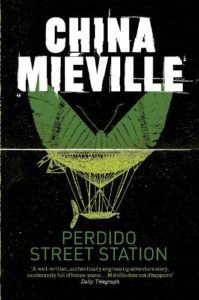 2000-2009 China Mieville – Perdido Street Station (2000)
2000-2009 China Mieville – Perdido Street Station (2000)
What. A. Book. This. Is.
I put off reading it for a while because of the sheer size of it, but oh my days is it worth it. China Mieville is one of the cleverest, imaginative, and downright weird writers out there. Every single one of his books reaches for the sky, most of the succeed, but this one absolutely smashes through it.
It’s 1000 pages of steam punk craziness set in the world of Bas-Lag (which he revisits in The Scar and Iron Council), where magic is real and considered a science, and New Crobozon is a sleazy, sexy, corrupt city full of weird and wonderful species such as the Falcon like Garudas, and the Khepri, who have human bodies and insects as heads.
Isaac Dan der Grimnebulin is a scientist who is approached by one of the Garuda, who has had his wings removed as punishment, to craft a new pair of wings to enable him to fly again. Isaac sends his team out into New Crobozon to bring back as many species with the ability to fly as possible so he can learn the secret of flight. Unknowingly he is brought back a caterpillar which will end up turning into something nasty enough to endanger the whole of the city.
It’s a whole lot more complicated than that and features a massive cast in a wonderfully vivid city. It won the Arthur C Clarke award (he’s won it a record 3 times in total) amongst many others and the legendary Michael Moorcock described Mieville as ‘a writer with a rare descriptive gift, an unusually observant eye for physical detail, for the sensuality and beauty of the ordinarily human as well as the thoroughly alien.’
Mieville has written some brilliant books after Perdido Street Station, not least the amazing The City and The City, but this is his masterpiece.
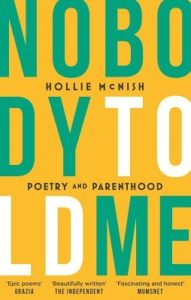 2010- 2020 – Nobody Told Me – Hollie McNish (2016)
2010- 2020 – Nobody Told Me – Hollie McNish (2016)
Hollie McNish is so forthright and honest and open and fearless as a writer that she ought to be compulsory reading. Her view of the world is hilarious and disarmingly honest. In this amazing book, which is part diary, part poetry and part essay, she turns her unflinching gaze onto motherhood as she narrates the first year of her daughter’s life.
My wife suffered horrendous post-natal depression with our first daughter, in no small part I believe due to the facile and fake way in which motherhood is portrayed in our modern culture. The awkward, unpleasant bits are whitewashed and hidden from view, and we’re presented with an unrealistic portrayal which is damaging to both mother and child.
Hollie McNish does no whitewashing. With Nobody Told Me she sets out to give an honest, personal, and deeply moving account of what it means to be a new mother, and in doing so goes some way to busting the harmful myths. She covers everything from morning sickness, to what it actually feels like to not sleep properly for months, the first public tantrum, mum guilt, leaky boobs, the changes a woman’s body goes through, but also the amazing gift that is having a child. It’s funny, touching, and profoundly moving.
I love the way Hollie McNish looks at the world and I love the way her words describe it. She’s a rare and genuine talent and should be considered a national treasure.
I have mentioned this before but, for me, the perfect five Decades selections are when I know one or two of the books and have read them before and then there are three books which I don’t know. A blend of new and familiar. Jamie has hit that perfect balance this week and I have already been checking out the books which were new to me.
My thanks to Jamie for finding time to make his selections. Decades continues entirely because of the kindness of my guests who all devote some of their precious time towards sharing the booklove.
DECADES WILL RETURN